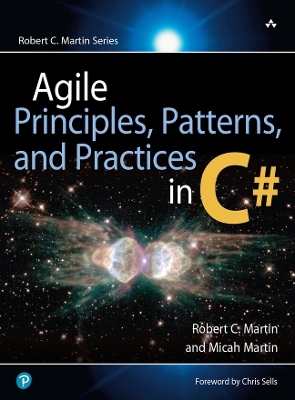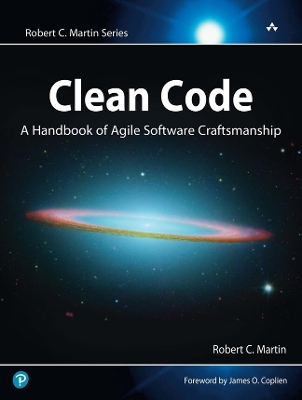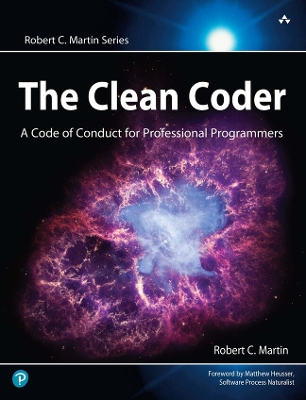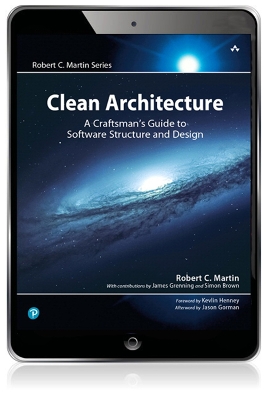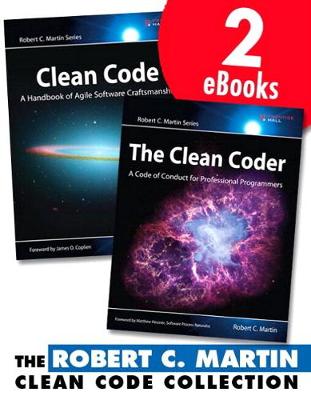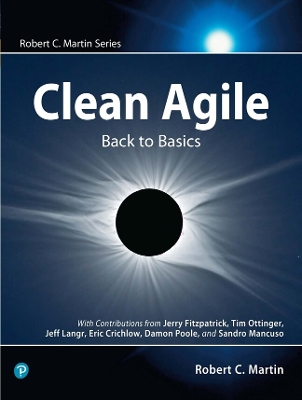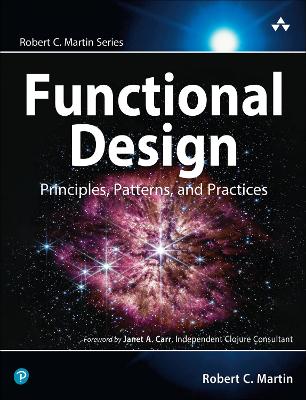Robert C. Martin
7 total works
Agile Principles, Patterns, and Practices in C#
by Robert C Martin and Micah Martin
With the award-winning book Agile Software Development: Principles, Patterns, and Practices, Robert C. Martin helped bring Agile principles to tens of thousands of Java and C++ programmers. Now .NET programmers have a definitive guide to agile methods with this completely updated volume from Robert C. Martin and Micah Martin, Agile Principles, Patterns, and Practices in C#.
This book presents a series of case studies illustrating the fundamentals of Agile development and Agile design, and moves quickly from UML models to real C# code. The introductory chapters lay out the basics of the agile movement, while the later chapters show proven techniques in action. The book includes many source code examples that are also available for download from the authors’ Web site.
Readers will come away from this book understanding
- Agile principles, and the fourteen practices of Extreme Programming
- Spiking, splitting, velocity, and planning iterations and releases
- Test-driven development, test-first design, and acceptance testing
- Refactoring with unit testing
- Pair programming
- Agile design and design smells
- The five types of UML diagrams and how to use them effectively
- Object-oriented package design and design patterns
- How to put all of it together for a real-world project
Whether you are a C# programmer or a Visual Basic or Java programmer learning C#, a software development manager, or a business analyst, Agile Principles, Patterns, and Practices in C# is the first book you should read to understand agile software and how it applies to programming in the .NET Framework.
Noted software expert Robert C. Martin presents a revolutionary paradigm with Clean Code: A Handbook of Agile Software Craftsmanship. Martin has teamed up with his colleagues from Object Mentor to distill their best agile practice of cleaning code “on the fly” into a book that will instill within you the values of a software craftsman and make you a better programmer—but only if you work at it.
What kind of work will you be doing? You’ll be reading code—lots of code. And you will be challenged to think about what’s right about that code, and what’s wrong with it. More importantly, you will be challenged to reassess your professional values and your commitment to your craft.
Clean Code is divided into three parts. The first describes the principles, patterns, and practices of writing clean code. The second part consists of several case studies of increasing complexity. Each case study is an exercise in cleaning up code—of transforming a code base that has some problems into one that is sound and efficient. The third part is the payoff: a single chapter containing a list of heuristics and “smells” gathered while creating the case studies. The result is a knowledge base that describes the way we think when we write, read, and clean code.
Readers will come away from this book understanding
- How to tell the difference between good and bad code
- How to write good code and how to transform bad code into good code
- How to create good names, good functions, good objects, and good classes
- How to format code for maximum readability
- How to implement complete error handling without obscuring code logic
- How to unit test and practice test-driven development
Programmers who endure and succeed amidst swirling uncertainty and nonstop pressure share a common attribute: They care deeply about the practice of creating software. They treat it as a craft. They are professionals.
In The Clean Coder: A Code of Conduct for Professional Programmers, legendary software expert Robert C. Martin introduces the disciplines, techniques, tools, and practices of true software craftsmanship. This book is packed with practical advice–about everything from estimating and coding to refactoring and testing. It covers much more than technique: It is about attitude. Martin shows how to approach software development with honor, self-respect, and pride; work well and work clean; communicate and estimate faithfully; face difficult decisions with clarity and honesty; and understand that deep knowledge comes with a responsibility to act.
Readers will learn
- What it means to behave as a true software craftsman
- How to deal with conflict, tight schedules, and unreasonable managers
- How to get into the flow of coding, and get past writer’s block
- How to handle unrelenting pressure and avoid burnout
- How to combine enduring attitudes with new development paradigms
- How to manage your time, and avoid blind alleys, marshes, bogs, and swamps
- How to foster environments where programmers and teams can thrive
- When to say “No”–and how to say it
- When to say “Yes”–and what yes really means
Great software is something to marvel at: powerful, elegant, functional, a pleasure to work with as both a developer and as a user. Great software isn’t written by machines. It is written by professionals with an unshakable commitment to craftsmanship. The Clean Coder will help you become one of them–and earn the pride and fulfillment that they alone possess.
Practical Software Architecture Solutions from the Legendary Robert C. Martin (“Uncle Bob”)
By applying universal rules of software architecture, you can dramatically improve developer productivity throughout the life of any software system. Now, building upon the success of his best-selling books Clean Code and The Clean Coder, legendary software craftsman Robert C. Martin (“Uncle Bob”) reveals those rules and helps you apply them.
Martin’s Clean Architecture doesn’t merely present options. Drawing on over a half-century of experience in software environments of every imaginable type, Martin tells you what choices to make and why they are critical to your success. As you’ve come to expect from Uncle Bob, this book is packed with direct, no-nonsense solutions for the real challenges you’ll face–the ones that will make or break your projects.
- Learn what software architects need to achieve–and core disciplines and practices for achieving it
- Master essential software design principles for addressing function, component separation, and data management
- See how programming paradigms impose discipline by restricting what developers can do
- Understand what’s critically important and what’s merely a “detail”
- Implement optimal, high-level structures for web, database, thick-client, console, and embedded applications
- Define appropriate boundaries and layers, and organize components and services
- See why designs and architectures go wrong, and how to prevent (or fix) these failures
Clean Architecture is essential reading for every current or aspiring software architect, systems analyst, system designer, and software manager–and for every programmer who must execute someone else’s designs.
Register your product for convenient access to downloads, updates, and/or corrections as they become available.
The Robert C. Martin Clean Code Collection (Collection)
by Robert C Martin
Clean Code: A Handbook of Agile Software Craftmanship
The Clean Coder: A Code of Conduct for Professional Programmers
In Clean Code, legendary software expert Robert C. Martin has teamed up with his colleagues from Object Mentor to distill their best agile practice of cleaning code "on the fly" into a book that will instill within you the values of a software craftsman and make you a better programmer--but only if you work at it. You will be challenged to think about what's right about that code and what's wrong with it. More important, you will be challenged to reassess your professional values and your commitment to your craft.
In The Clean Coder, Martin introduces the disciplines, techniques, tools, and practices of true software craftsmanship. This book is packed with practical advice--about everything from estimating and coding to refactoring and testing. It covers much more than technique: It is about attitude. Martin shows how to approach software development with honor, self-respect, and pride; work well and work clean; communicate and estimate faithfully; face difficult decisions with clarity and honesty; and understand that deep knowledge comes with a responsibility to act.
Readers of this collection will come away understanding
How to tell the difference between good and bad code
How to write good code and how to transform bad code into good code
How to create good names, good functions, good objects, and good classes
How to format code for maximum readability
How to implement complete error handling without obscuring code logic
How to unit test and practice test-driven development
What it means to behave as a true software craftsman
How to deal with conflict, tight schedules, and unreasonable managers
How to get into the flow of coding and get past writer's block
How to handle unrelenting pressure and avoid burnout
How to combine enduring attitudes with new development paradigms
How to manage your time and avoid blind alleys, marshes, bogs, and swamps
How to foster environments where programmers and teams can thrive
When to say "No"--and how to say it
When to say "Yes"--and what yes really means
"In the journey to all things Agile, Uncle Bob has been there, done that, and has the both the t-shirt and the scars to show for it. This delightful book is part history, part personal stories, and all wisdom. If you want to understand what Agile is and how it came to be, this is the book for you."
Grady Booch
"Bob's frustration colors every sentence of Clean Agile, but it's a justified frustration. What is in the world of Agile development is nothing compared to what could be. This book is Bob's perspective on what to focus on to get to that what could be. And he's been there, so it's worth listening."
Kent Beck
It's good to read Uncle Bob's take on Agile. Whether just beginning, or a seasoned Agilista, you would do well to read this book. I agree with almost all of it. It's just some of the parts make me realize my own shortcomings, darn it. It made me double-check our code coverage (85.09%)."
Jon Kern
Nearly twenty years after the Agile Manifesto was first presented, the legendary Robert C. Martin ("Uncle Bob") reintroduces Agile values and principles for a new generation-programmers and nonprogrammers alike. Martin, author of Clean Code and other highly influential software development guides, was there at Agile's founding. Now, in Clean Agile: Back to Basics, he strips away misunderstandings and distractions that over the years have made it harder to use Agile than was originally intended.
Martin describes what Agile is in no uncertain terms: a small discipline that helps small teams manage small projects . . . with huge implications because every big project is comprised of many small projects. Drawing on his fifty years' experience with projects of every conceivable type, he shows how Agile can help you bring true professionalism to software development.
- Get back to the basics – what Agile is, was, and should always be
- Understand the origins, and proper practice, of SCRUM
- Master essential business-facing Agile practices, from small releases and acceptance tests to whole-team communication
- Explore Agile team members' relationships with each other, and with their product
- Rediscover indispensable Agile technical practices: TDD, refactoring, simple design, and pair programming
- Understand the central roles values and craftsmanship play in your Agile team’s success
If you want Agile's true benefits, there are no shortcuts: You need to do Agile right. Clean Agile: Back to Basics will show you how, whether you're a developer, tester, manager, project manager, or customer. Register your book for convenient access to downloads, updates, and/or corrections as they become available. See inside book for details.
A Practical Guide to Better, Cleaner Code with Functional Programming
In Functional Design, renowned software engineer Robert C. Martin ("Uncle Bob") explains how and why to use functional programming to build better systems for real customers. Martin compares conventional object-oriented coding structures in Java to those enabled by functional languages, identifies the best roles for each, and shows how to build better systems by judiciously using them in context.
Martin's approach is pragmatic, minimizing theory in favor of "in the-trenches" problem-solving. Through accessible examples, working developers will discover how the easy-to-learn, semantically rich Clojure language can help them improve code cleanliness, design, discipline, and outcomes. Martin examines well-known SOLID principles and Gang of Four Design Patterns from a functional perspective, revealing why patterns remain extremely valuable to functional programmers, and how to use them to achieve superior results.
- Understand functional basics: immutability, persistent data, recursion, iteration, laziness, and statefulness
- Contrast functional and object approaches through expertly crafted case studies
- Explore functional design techniques for data flow
- Use classic SOLID principles to write better Clojure code
- Master pragmatic approaches to functional testing, GUIs, and concurrency
- Make the most of design patterns in functional environments
- Walk through building an enterprise-class Clojure application
"Functional Design exudes 'classic-on-arrival'. Bob pulls back the curtain to reveal how functional programming elements make software design simple yet pragmatic. He does so without alienating experienced object-oriented programmers coming from languages like C#, C++, or Java."
--Janet A. Carr, Independent Clojure Consultant
Register your book for convenient access to downloads, updates, and/or corrections as they become available. See inside book for details.
